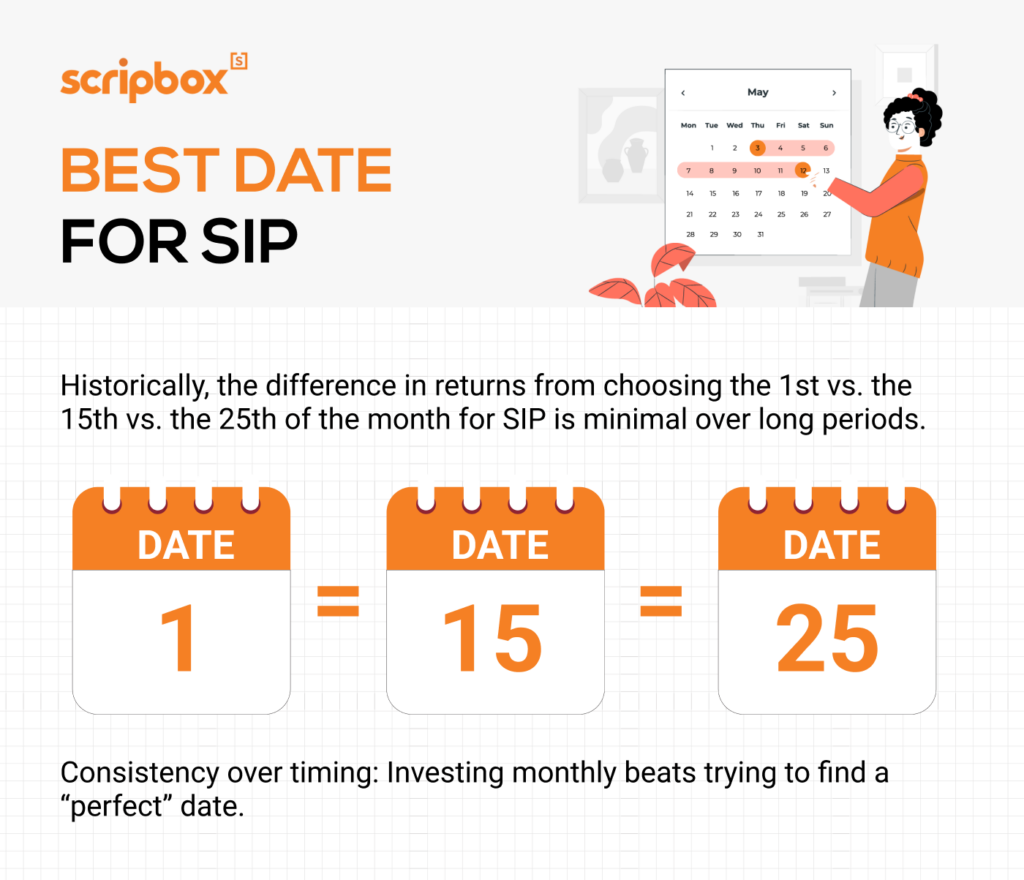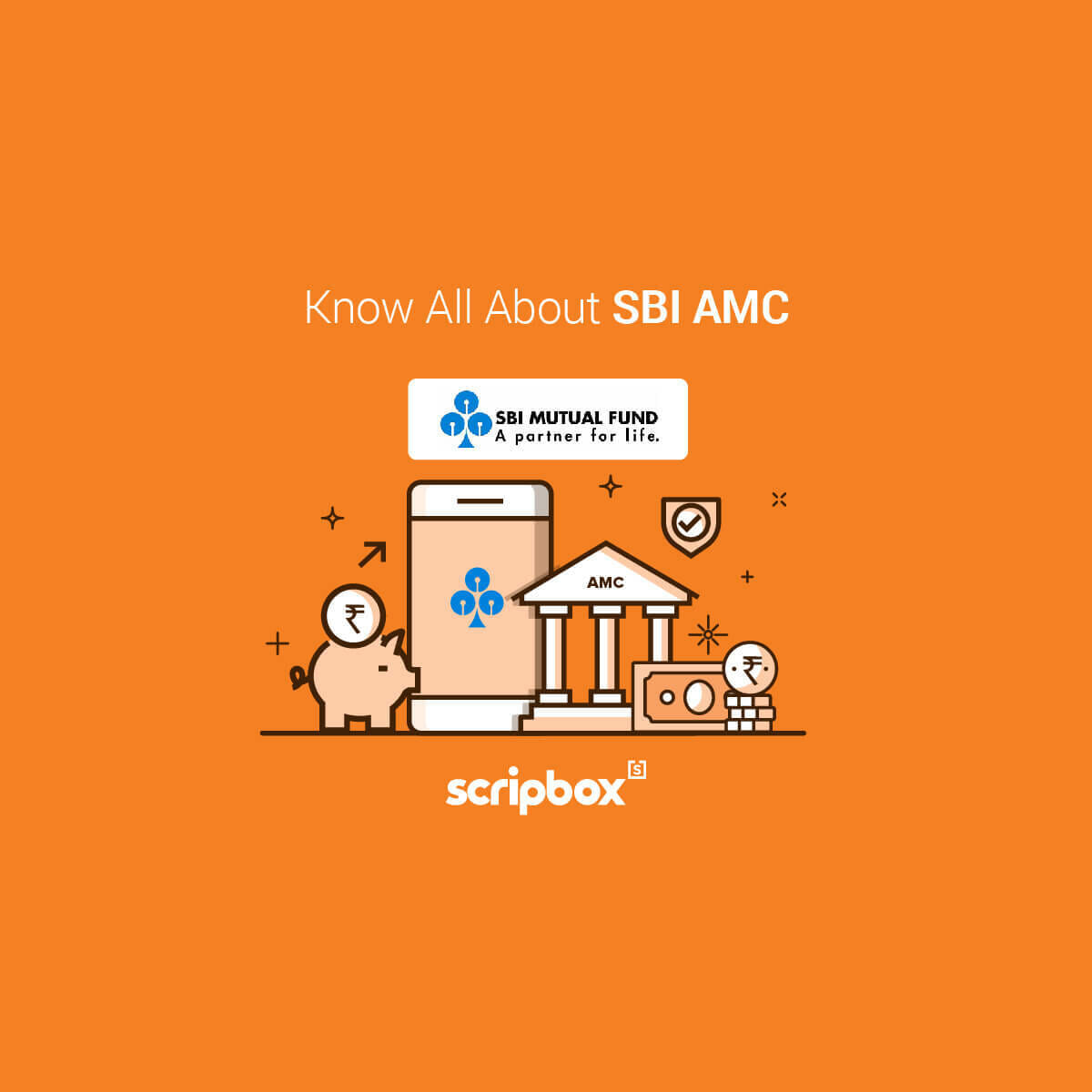We all want to make the best out of our investments. When buying something, we all want it at the best (lowest) price possible – be it while booking a flight or vacation or buying mutual funds or stocks. Hence, we try to buy low and sell high. But timing the markets has often resulted in investors burning their fingers. SIPs in mutual funds help you deal with market volatility over time. The mutual fund house allows you to pick a suitable date for SIPs. Let’s see which is the best date for a sip in mutual funds.
Which Date is Best for SIP in Mutual Fund?
When you are given the option to pick any date in the month for your SIP investing, it often becomes difficult to narrow down one. Different investors have different theories per their convenience. Some say it is best to invest during the start of the month, while some say it’s best to schedule your SIPs towards the end of the month. Usually, at the end of the month, the markets are volatile due to F&O settlements. While some argue mid-month is best.
Well, everyone has their theory and strategy. But let’s see if the SIP date matters while investing. Let’s assume Mr Kumar started his investment journey in January 2013. He stopped his SIPs in December 2022. He invested in the Nifty 100 index, and the SIP amount was INR 10,000 monthly. Let’s see how different his returns would have been if his SIP date was 1st, 5th, 10th, 15th, 20th, 25th or 28th.
| Nifty 100 SIP Date | Value of Investment | IRR |
| 1 | ₹20,61,265 | 10.43% |
| 5 | ₹20,63,436 | 10.47% |
| 10 | ₹20,63,049 | 10.49% |
| 15 | ₹20,59,676 | 10.49% |
| 20 | ₹20,57,926 | 10.50% |
| 25 | ₹20,63,601 | 10.58% |
| 28 | ₹20,58,055 | 10.54% |
When looking into the value of the investments (at the end of the tenure), there isn’t much difference in the returns. Irrespective of the SIP date, the returns are almost the same. Where the IRR fluctuates in the range of 10.43% to 10.54%. The highest IRR was when the SIP date was 25th (10.58%). While the lowest IRR is for SIP on the 1st (10.43%). A difference of 0.15%.
However, the difference in value terms is hardly INR 2,300. Thus, since there is a negligible difference in value, it proves that the SIP date doesn’t really impact your returns much.
Finding Out the Best SIP Date
| Date of Investment | SIP in NIFTY 50 TRI | SIP in NIFTY Midcap 150 TRI | SIP in NIFTY Smallcap 250 TRI |
|---|---|---|---|
| 1 | 12.00 | 15.87 | 12.73 |
| 2 | 12.00 | 15.86 | 12.71 |
| 3 | 12.02 | 15.88 | 12.71 |
| 4 | 12.02 | 15.86 | 12.70 |
| 5 | 12.00 | 15.85 | 12.67 |
| 6 | 12.03 | 15.87 | 12.69 |
| 7 | 12.03 | 15.86 | 12.68 |
| 8 | 12.02 | 15.86 | 12.66 |
| 9 | 11.99 | 15.85 | 12.65 |
| 10 | 12.00 | 15.86 | 12.66 |
| 11 | 12.03 | 15.89 | 12.69 |
| 12 | 12.05 | 15.92 | 12.72 |
| 13 | 12.03 | 15.91 | 12.71 |
| 14 | 12.04 | 15.90 | 12.71 |
| 15 | 12.03 | 15.91 | 12.72 |
| 16 | 12.02 | 15.93 | 12.74 |
| 17 | 12.01 | 15.91 | 12.72 |
| 18 | 11.99 | 15.89 | 12.71 |
| 19 | 12.00 | 15.90 | 12.71 |
| 20 | 12.00 | 15.90 | 12.71 |
| 21 | 12.05 | 15.94 | 12.75 |
| 22 | 12.06 | 15.97 | 12.78 |
| 23 | 12.05 | 15.96 | 12.77 |
| 24 | 12.07 | 16.00 | 12.82 |
| 25 | 12.06 | 16.00 | 12.83 |
| 26 | 12.06 | 16.00 | 12.83 |
| 27 | 12.05 | 15.98 | 12.82 |
| 28 | 12.06 | 16.00 | 12.86 |
| 29 | 12.04 | 15.96 | 12.82 |
| 30 | 12.01 | 15.93 | 12.79 |
| The above data is based on 10 Year SIP – March 2013-March 2023, The above returns are in % | |||

No SIP Date Advantage
We can pick our favorite fund, run a similar exercise, and compare the XIRR. To our surprise, the results may be different. For instance, considering the above example, the SIP date of the 25th may help Mr Kumar generate slightly higher returns. Thus, the suitable date is the 25th. Similarly, when comparing different funds belonging to other sectors and categories, the results may not conclude that the SIP date of the 25th is the best. Some funds may have the best SIP date as the 1st, while some 5th and others 28th. Since markets are unpredictable, it is difficult to tell that a certain date is best for SIP.
The idea of SIP investing is to not worry about timing the markets. Any day can be the best day. As seen in the above example, the returns are not drastically different. The difference in gains is almost negligible. SIP investing is all about investing regularly without skipping your SIPs, and this will ultimately help you in rupee-cost averaging.
Therefore, don’t worry about the best date or the worst date. Pick a date you are comfortable with, be consistent with your investments, and have a long-term horizon. You can use Scripbox’s SIP calculator to assess your SIP returns better and make informed decisions.
What Should You Do?
Starting your investment journey can feel overwhelming, and it’s natural to have doubts. Questions like “Am I picking the right fund?”, “Is this the best SIP date?”, or “Is my SIP amount enough?” are common. Feeling uncertain is part of the process. The key is to stick to the basics and move forward step by step. When setting up your SIPs (Systematic Investment Plans) and choosing the right date, here are some crucial points to keep in mind:
1. Don’t Try to Time Your SIPs
SIP investments thrive on consistency. The idea behind SIPs is to average out market fluctuations by investing regularly, regardless of the market’s ups and downs. Trying to find the “perfect” SIP date isn’t necessary—historically, the returns don’t vary significantly across different SIP dates. So, instead of stressing over timing, pick a date that aligns with your financial schedule and stick to it.
Doing this ensures your investments are seamless and aligned with your overall financial stability without getting bogged down by market timing.
2. Ensure Sufficient Funds in Your Account
SIPs work on auto-debit, meaning the money is withdrawn from your bank account on the chosen SIP date. Therefore, it is crucial to have enough funds in your account to avoid missing an installment.
- Salaried Individuals: If your salary is credited during the first week of the month, choosing a date after that ensures you’ll have funds ready.
- Self-Employed or Freelancers: If your income varies, pick a date later in the month when you’re confident there will be funds available.
Missing an SIP due to insufficient balance won’t penalize you directly, but it disrupts your investment plan and may impact long-term returns. On the other hand, if you have steady cash flow and funds in your account, you can choose any date that suits you.
3. Diversify With Your SIPs
If you’re investing in multiple SIPs, spreading them across different dates in the month can be a good strategy. For example:
- Set one SIP for the 5th of the month, another for the 15th, and a third for the 25th.
This approach ensures that your investments are not lumped together, giving you flexibility to manage your cash flow better. It also allows for regular investing without tying all your investments to one specific date.
4. Match Your SIPs to Your Financial Rhythm
Every investor’s financial situation is unique. The best SIP date is the one that matches your income cycle and financial responsibilities. Whether it’s the start, middle, or end of the month, choose a date that lets you meet all your essential expenses first and ensures there’s enough left over for your SIP installment.
To Conclude
Mutual funds do not mandate any particular deadline for SIP investments. The best date for SIP is the one that you are comfortable with. Every investor is unique, and so is their financial situation. Therefore, you should choose the SIP date after considering your access to funds.
When investing in SIPs, you should have sufficient funds in your bank account after meeting all your financial responsibilities. Therefore, choose a date keeping the access to funds in mind because you do not want to miss/ skip any instalment due to lack of funds.
Discover More:
- What is SIP?
- SIP vs Mutual Fund
- How to Invest in SIP?
- How to Stop SIP?
- Best Time to Invest in Mutual Funds























Show comments